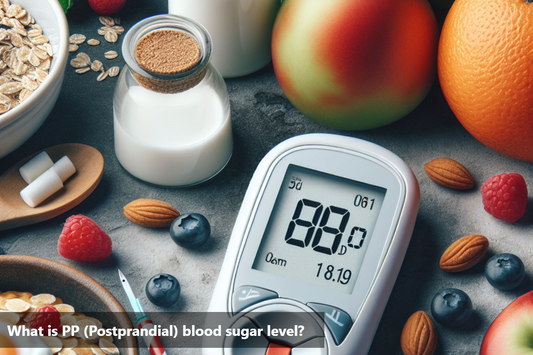Gaining weight can be hard for people with diabetes. It's important to find a good balance between staying at a healthy weight and managing diabetes well. Keeping a healthy weight helps control blood sugar levels, lowers the chance of problems, and makes you feel better overall. If you have diabetes, gaining weight in a healthy way needs a plan that fits your needs.
One big problem for people with diabetes is finding the right balance between gaining weight in a healthy way and keeping blood sugar levels stable. It's best to focus on building muscle and eating foods that are full of nutrients instead of having sugary, high-calorie snacks.
Understanding the Relationship Between Weight and Diabetes
The relationship between weight and diabetes is complex and multifaceted, influenced by various factors such as body composition, metabolic health, genetic predisposition, lifestyle habits, and underlying medical conditions. Here are some key aspects of this relationship:
Obesity and Type 2 Diabetes Risk
-
Being too heavy is a big reason why people get type 2 diabetes. Extra weight, especially in the belly area, can make it harder for the body to use insulin properly. When cells don't respond well to insulin, it messes up how the body regulates sugar, leading to high sugar levels and, eventually, type 2 diabetes.
Weight Gain and Insulin Trouble
-
Getting heavier, especially when fat builds up in the belly, makes insulin issues worse and raises the chance of getting type 2 diabetes. Fat tissues release hormones and substances that can mess up how insulin works and make it tough for the body to use sugar.
Weight Loss and Better Insulin Function
-
On the flip side, shedding pounds, especially by changing what you eat, getting active, and modifying behavior, can help the body use insulin better and control blood sugar in people with diabetes or prediabetes. Even losing a little weight, like 5-10% of your starting weight, can make a big difference in sugar levels, fats in the blood, blood pressure, and overall health.
Body Makeup and Diabetes Risk
-
A person's body composition, like where fat and muscle are stored, plays a big role in diabetes risk. Having too much fat around the organs in the belly area can really mess with health and is closely linked to insulin problems, inflammation, and a higher risk of type 2 diabetes, heart issues, and other metabolic troubles.
Family Traits
-
Genes can also affect how weight impacts diabetes risk. Some gene differences can make people more likely to be obese, have insulin issues, or get type 2 diabetes, no matter how they live. But having these genes doesn't mean you'll definitely get diabetes, and changing your habits can make a difference.
Better Habits
-
Making changes like eating well, moving more, managing stress, getting good sleep, and avoiding smoking are key for preventing and handling diabetes. These habits can help with weight loss, improve how insulin works, and lower the chances of getting type 2 diabetes or problems from it.
Personalized Approach
-
It's important to know that weight and diabetes don't affect everyone the same way. Different people will respond differently to weight management plans based on things like age, gender, background, health history, medications, and metabolism. That's why it's crucial to have tailored approaches to diabetes care and prevention, including medical, dietary, behavioral, and mental health support, to get the best results and enhance well-being in the long run.
Tips and Strategies for Healthy Weight Gain with Diabetes
-
Consult with a Registered Dietitian: Work with a registered dietitian or healthcare provider who specializes in diabetes care to develop a personalized nutrition plan tailored to your specific needs, preferences, and health goals.
-
Increase Caloric Intake: Consume calorie-dense foods and beverages to increase overall energy intake. Choose nutrient-rich options to ensure you're getting essential vitamins, minerals, and other nutrients along with calories.
-
Choose Healthy Fats: Incorporate healthy fats into your diet, such as avocados, nuts, seeds, olive oil, and fatty fish like salmon and mackerel. These foods provide concentrated calories and essential fatty acids without raising blood sugar levels significantly.
-
Include Protein-Rich Foods: Consume adequate protein to support muscle growth and repair. Choose lean protein sources such as poultry, fish, tofu, legumes, eggs, and dairy products. Protein-rich snacks like Greek yogurt, cottage cheese, and protein shakes can also help increase calorie and protein intake.
-
Eat Frequent, Balanced Meals: Aim for three main meals and two to three snacks throughout the day to ensure consistent energy intake. Include a balance of carbohydrates, protein, and healthy fats at each meal and snack to help stabilize blood sugar levels and promote satiety.
-
Opt for Nutrient-Dense Foods: Choose nutrient-dense foods that provide essential nutrients along with calories, such as whole grains, fruits, vegetables, and dairy products. Limit processed foods, sugary snacks, and empty-calorie foods that provide little nutritional value.
-
Add Healthy Snacks: Incorporate calorie-dense snacks between meals to boost overall calorie intake. Snack options may include nuts, seeds, nut butter, cheese, yogurt, granola bars, dried fruits, and whole-grain crackers.
-
Monitor Blood Sugar Levels: Keep track of your blood sugar levels regularly to ensure they remain within target ranges. Adjust your meal plan, medication, and insulin doses as needed to maintain stable blood sugar control while increasing calorie intake.
-
Stay Hydrated: Drink plenty of fluids throughout the day, including water, herbal tea, and low-calorie beverages, to stay hydrated and support overall health.
-
Gradual Changes: Make gradual changes to your diet and lifestyle to avoid overwhelming your body and digestive system. Aim for slow, steady weight gain over time rather than rapid fluctuations.
-
Physical Activity: Incorporate regular physical activity into your routine to promote muscle growth, strength, and overall health. Consult with a healthcare provider or exercise specialist to develop a safe and appropriate exercise plan tailored to your needs and fitness level.
-
Monitor Progress: Keep track of your weight, calorie intake, blood sugar levels, and overall well-being to monitor progress and make adjustments as needed. If you're not seeing the desired results or experiencing challenges, consult with a healthcare provider or registered dietitian for guidance and support.
Meal Plans and Recipes for Weight Gain with Diabetes
Sample Meal Plan:
- Breakfast: Scrambled eggs with avocado on whole-grain toast, Greek yogurt with berries, unsweetened almond milk.
- Morning Snack: Cheese and whole-grain crackers, mixed nuts and dried fruits, hummus with veggie sticks.
- Lunch: Grilled chicken salad with mixed greens and almonds, quinoa or brown rice with roasted vegetables.
- Afternoon Snack: Smoothie with banana, spinach, almond butter, and Greek yogurt, cottage cheese with fruit.
- Dinner: Baked salmon or tofu with sweet potatoes and broccoli, whole-grain pasta with turkey and vegetables.
- Evening Snack: Apple slices with peanut butter, air-popped popcorn, trail mix.
Recipes:
-
High-Protein Smoothie: Blend banana, spinach, almond butter, Greek yogurt, and almond milk.
-
Quinoa Stir-Fry: Sauté mixed vegetables, cooked quinoa, and chicken/tofu with soy sauce.
-
Baked Salmon with Sweet Potatoes: Season salmon and sweet potatoes with olive oil, garlic, and spices, then bake.
-
Greek Yogurt Parfait: Layer Greek yogurt, granola, and berries.
-
Cheese and Crackers Platter: Serve assorted crackers, cheese, fruit, and veggies with hummus.
Bottom Line
Gaining weight with diabetes can be tough, but it's crucial for good health. It’s important to consult healthcare professionals for tailored advice and safe weight gain. Working closely with healthcare providers is key to managing diabetes and gaining weight healthily. A balanced diet, regular physical activity, and continuous support from healthcare professionals are essential. Team up with healthcare workers to face weight management challenges and improve health.
This Blog post is an initiative by DiabeSmart, to provide accurate and Nutritionist / Doctor approved information related to Diabetes. DiabeSmart is India's first Food brand designed specifically for Diabetics, that has been clinically tested on Diabetics and Pre-Diabetics to deliver 55% - 70% lower Sugar spikes. DiabeSmart is part of Lo! Foods - India's leading brand for Everyday Functional Health foods.















